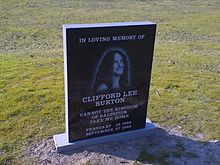Cliff Burton
Clifford Lee Burton (February 10, 1962 – September 27, 1986) was an American musician. He is best known for playing the bass guitar in the thrash metal band Metallica from 1982 until his death in 1986.
Cliff Burton | |
|---|---|
 Burton in 1983 | |
| Background information | |
| Birth name | Clifford Lee Burton |
| Born | February 10, 1962 Castro Valley, California, United States |
| Died | September 27, 1986 (aged 24) Ljungby Municipality, Sweden |
| Genres | Thrash metal, speed metal |
| Occupation(s) | Musician, songwriter |
| Instruments | Bass |
| Years active | 1979–1986 |
Burton's early musical journey includes performing in bands such as EZ-Street and Agents of Misfortune. He was discovered by James Hetfield and Lars Ulrich while performing in Los Angeles, who asked him to take over the place of the bassist of Metallica at the time, Ron McGovney.

He died during a European tour in Sweden on September 24, 1986 when Metallica was celebrating the success of their album Master of Puppets. The band’s tour bus skidded off the road and flipped over. Burton was thrown out of the bus window and the bus fell on him. They attempted to rescue Burton from underneath the bus by lifting it with a crane, but the crane slipped, and the bus landed down on top of Burton a second time.[1] By that time, he was already dead at just 24 years old.
Early life
changeBurton was born in Castro Valley, California. He was born to Raymond "Ray" (1925–2020) and Janette "Jan" Burton (1925–1993). He had two older siblings, Scott (1958–1975) and Connie. Burton's liking in music began when his father introduced him to classical music and he began taking piano lessons.
Burton started having an interest in the genres of rock, classical, country and then heavy metal during his teenage years. After the death of his brother, who died from a brain aneurysm,[2] he started playing the bass at age 13. He practiced his bass up to six hours per day (even after joining Metallica). His parents quoted him as saying, "I'm going to be the best bassist for my brother."[3] Along with classical and jazz, Burton's other early influences varied from Southern rock and country to the blues.[4]
Burton cited Geddy Lee, Geezer Butler, Stanley Clarke, Lemmy Kilmister, and Phil Lynott as big influences on his style of bass playing.[5]
Discography
changeWith Metallica
changeStudio albums
change- Kill 'Em All (1983)
- Ride the Lightning (1984)
- Master of Puppets (1986)
- ...And Justice For All (1988) (posthumous writing credit on "To Live Is to Die")
Video
- Cliff 'em All (1987)
Demos
- No Life 'til Leather (1982) (credited but does not play)
- Megaforce (1983)
- Ride the Lightning (1983)
- Master of Puppets (1985)
Compilations
- Garage Inc. (1998) (featured on "Am I Evil?" and "Blitzkrieg" only)
References
change- ↑ "26 Years Ago: Metallica Bassist Cliff Burton Dies in a Bus Accident". Retrieved 2012-12-30.
- ↑ Sevinc, Bihter (2022-02-17). "The Oath Cliff Burton Dedicated His Life To After Losing His Brother". Rock Celebrities. Retrieved 2024-09-30.
- ↑ "All Metallica - Info - Interviews - Interview With Cliff Burton's Parents". web.archive.org. 2007-10-23. Archived from the original on 2008-05-16. Retrieved 2024-09-30.
{{cite web}}: CS1 maint: bot: original URL status unknown (link) - ↑ "Bass Player". guitarworld. 2024-09-29. Retrieved 2024-09-30.
- ↑ "JoyZine - Cliff Burton (Metallica) Interview by Harald O." web.archive.org. 2007-12-29. Archived from the original on 2007-12-29. Retrieved 2024-09-30.
{{cite web}}: CS1 maint: bot: original URL status unknown (link)